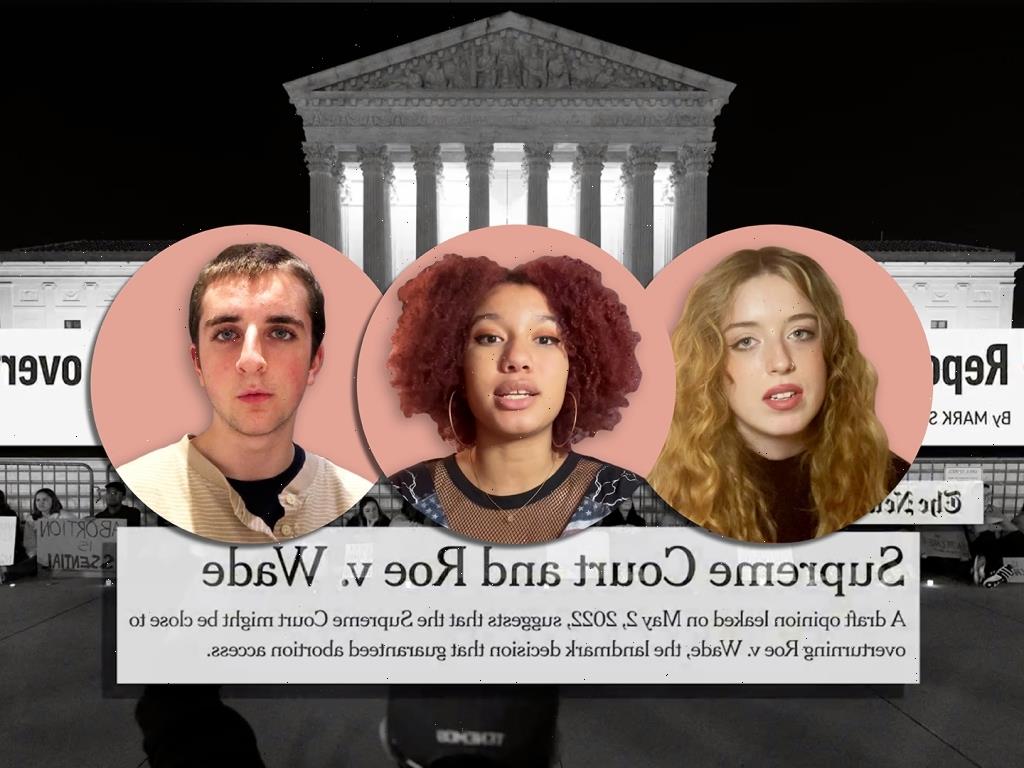It’s news that people with eyes on reproductive healthcare and politics have been anticipating and dreading — Friday, June 24 is the day the Supreme Court of the United States drops its ruling on the Dobbs v. Jackson Women’s Health Organization, the case argued in 2021 that would challenge precedents set by Roe vs. Wade and Planned Parenthood vs. Casey and access to abortion as a right in the United States. But for members of Gen Z — lauded far and wide as the most progressive and diverse generation we’ve ever seen — this day stands out as a particularly stark moment in their (still very young) lives marked by a lot of stand-out crises (a once in a generation pandemic, a climate crisis and a mental health crisis to name a few).
A draft of Justice Alito’s opinion on the case that would see Roe v. Wade functionally struck down in the Supreme Court was leaked in early May, leading to alarm, outrage and resigned sadness among people who have been watching abortion rights be attacked over the last few decades and it was a highly emotional and stressful time. So we also checked in with the group of young people we’ve been watching grow up through it all — our Hatch Kids — shortly after the opinion leaked to get a feel for where their heads and hearts were at while once again (maybe reluctantly) living through history. And, undeniably, it’s a vulnerable time for them, as these kids are actively witnessing the rights that their parents had during their reproductive years disappear as they reach young adulthood.
“The news about Roe v Wade made me angry because it felt regressive for our country,” Reed said. “…It felt like an accomplishment of the past, like the right to birth control or women’s right to vote in America. It felt established…What’s scary is something that feels safe, something that feels like ‘Oh, this has already happened. We already won this,’ can be undone.”
As we look at the most recent data on young people and abortion access, the numbers do show that young people in the 18-29 age-range have the highest levels of support for safe and legal access to abortion. Per a recent report from the Pew Research center in early May, about six-in-ten Americans (61 percent) say abortion should be legal in “all” or “most” case with almost 25 percent more young people favoring access. Members of Gen Z are significantly less likely to have so-called “moral objections” to abortion access as well, compared to their older counterparts.
“It felt established…What’s scary is something that feels safe, something that feels like ‘Oh, this has already happened. We already won this,’ can be undone.”
Per the Pew report: “Younger adults are considerably more likely than older adults to say abortion should be legal: Three-quarters of adults under 30 (74 percent) say abortion should be generally legal, including 30% who say it should be legal in all cases without exception ”
And, again, we’re talking about a generation that is on-track to be one of the most well-educated ones we’ve ever seen. That’s clearly reflected in how teens talk about the last few decades of Supreme Court strategy (one of the most contentious political issues of recent years) and it reveals both a deep understanding of the different power players, the various motivations and the disillusionment with the idea of “playing nice in a broken system” that is not only failing to serve them but doing them harm. And when they come ready to discuss this topic, they come with facts, they come with stats and they come with a deep sense of justice that feels contagious.
“Personally I think it’s disgusting that women no longer have a right to bodily autonomy,” Gabrielle said. “But I also think that this decision was inevitable due to the packing of the courts by conservatives and the unwillingness of Democrats to fully talk about Roe and codify it into law when there were Democratic supermajorities.” Citing the politicians who ran on platforms of protecting Roe v. Wade only to become silent and inactive when it came time to actually protect it, she says that silence and willingness to use abortion rights as a bargaining chip with voters is “what made this current situation a reality, because Democrats completely ignored the fundamental basic rights that Roe v. Wade protected.”
While the adults in their lives can’t do a lot by way of comfort or protection from rulings made by the highest federal courts, it’s important to remember that adults can always continue to make the space for young people’s feelings during these kind of scary moments and can and should continue to have conversations about reproductive rights, making informed and science-based reproductive healthcare decisions and ways they can take action as young adults to continue to advocate for expanding and reclaiming those rights.
Before you go, check out the powerful stories of these celebs who opened up about their abortions:

Source: Read Full Article
